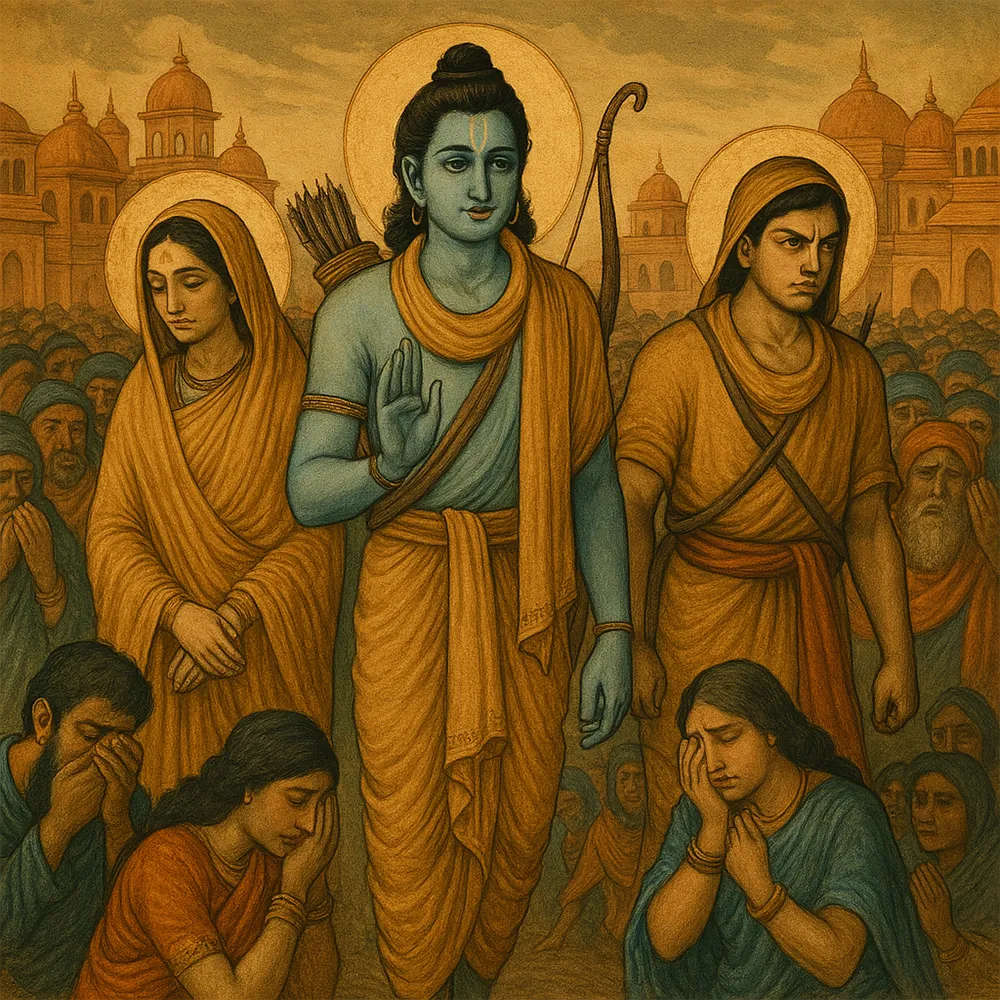The golden sun rose upon Ayodhya, but within the palace, a sorrow darker than night had settled. The birds sang, the people rejoiced, all unaware that fate had turned its cruel face towards their beloved prince.
King Dasharatha, broken and pale, lay upon the cold marble floor of Kaikeyi’s chamber. His eyes, once bright with pride, now brimmed with tears that no one could stop.
Summoning what little strength he had, Dasharatha called for his son — his Rama.
With a heart full of joy, unaware of the cruel storm awaiting him, Rama entered the chamber, his steps light, his face glowing like the morning sun.
“Father, you called?” Rama’s voice was gentle, his eyes searching his father’s face. But the king could not speak — his voice caught in his throat, his heart too heavy with sorrow.
It was Kaikeyi who broke the silence, her voice cold and sharp. “Rama, your father has granted me two boons. Listen well. Bharata shall be crowned the king, and you, O Rama, must leave for the forest — this very day. You shall wear the bark of trees, live like a hermit, and remain there for fourteen long years.”
Rama stood still, like a mountain unmoved by the storm. Not a tear fell from his eyes, nor did his lips tremble.
With a serene smile, he bowed low. “So be it, Mother. If this is your wish, and my father’s word, I shall go. The forest shall be my home, and duty my path. Let Bharata rule — my love and blessings shall be with him.”
Dasharatha cried out, his voice breaking like a river bursting its banks. “Rama! My son, my life! Forgive me, for I am bound by my word. I did not wish this upon you.”
Rama knelt before his father, his hands folded. “Father, do not grieve. You are my king, my guide, my world. To fulfill your word is my greatest joy. Bless me, that I may walk this path without sorrow.”
Tears flowed like rivers down Dasharatha’s face, but Rama’s heart remained steady, shining with the light of dharma.
Before leaving, Rama went to his mother, Kaushalya. When she heard the cruel decree, she clung to him, her cries filling the air.
“My son, how can I let you go? The forest is filled with dangers, wild beasts, and cruel Rakshasas. How will my gentle child survive?”
Rama smiled softly, “Mother, fear not. My duty is my shield, and the blessings of my parents my armor. Let me go, so that righteousness may be upheld.”
Lakshmana, hearing of Rama’s exile, burned with rage. “This is unjust! I shall not stay back. I shall follow you, my brother, and protect you with my life.”
Rama tried to calm him, but Lakshmana’s love could not be stopped. “Wherever you go, I go. The forest shall be my home, if it shelters you.”
Then came Sita, Rama’s beloved, her eyes filled with tears, her voice trembling. “My lord, where you go, I shall follow. The palace holds no joy for me without you. Let me walk by your side, share your exile, your joys, and your sorrows.”
Rama pleaded, “Sita, the forest is no place for a princess. Thorns shall tear your feet, wild winds shall whip your hair. Stay, beloved, stay and care for my mother.”
But Sita stood firm, her love shining like the moon. “My place is by your side, Rama. The forest will bloom if I am with you, and every hardship will be sweetened by your love.”
Seeing her unwavering heart, Rama agreed. Together, they prepared for the journey — casting off royal silks and adorning simple clothes of bark.
As Rama, Sita, and Lakshmana walked towards exile, Ayodhya wept. The streets filled with people, their eyes brimming with tears, their hearts breaking as they watched their prince — their pride — walk away from the throne, choosing duty over desire.
And so, with heads held high and hearts full of grace, Rama, Sita, and Lakshmana left Ayodhya — stepping into the forest, into the unknown — where destiny awaited them with open arms.

